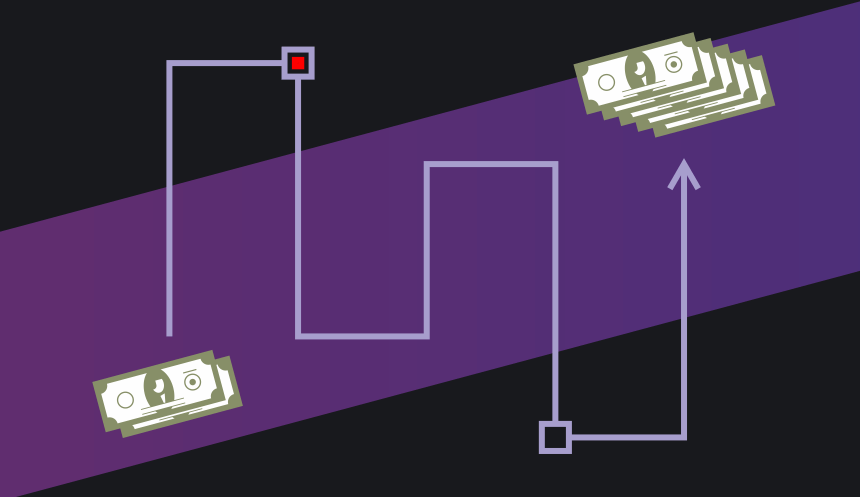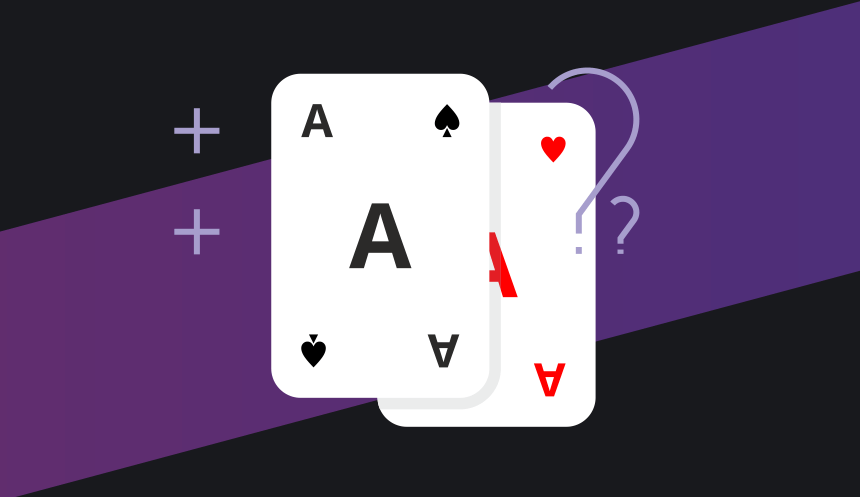
There are timeless topics that will always give philosophers a reason to start a small scuffle or a big war – depending on how much tequila they drank in a bar. Who would win in a fight – an elephant or a whale? Which country is greater – the USA or China? And which is better – trading or investing?
The timeless questions are timeless because they reflect the duality of our world. And it’s not just a struggle of opposites but your personal choice that is at the center of the conflict – whether you are choosing a political party, your destiny, or the meaning of life… Well, perhaps, I exaggerated it a bit when I mentioned an elephant and a whale. But the choice between trading and investing is rather crucial. So the problem we have on our agenda today is not only practical but also philosophical. (By the way, there is actually a concept called «trading philosophy». One day we’ll discuss it in more detail).
Of course, the easiest thing to do is to boil the problem down to a simple «it’s where I’ll make more money». But it is a much more complicated matter. When you choose whether to become a trader or an investor, you decide on your:
- Work style.
- Attitude to risk.
- Life strategy.
- And most importantly – on your way of thinking.
Traditionally, it is considered that the central confrontation in trading is the ever-burning conflict between «bulls» and «bears». There is even a statue depicting them near the Frankfurt Stock Exchange. But there is also another (possibly stronger) conflict – the conflict between investors and speculators.
The thing is that the «bear vs. bull» war doesn’t affect the framework of one’s way of thinking: depending on a situation, bears can easily turn into bulls, and vice versa. It’s more of a question of currently prevailing «bullish» or «bearish» trends. Of course, a person may tend to choose either long or short trades but most modern speculators know how to work both in a rising and falling market. Moreover, it is one of the signs of professionalism; it’s the guarantee that you will always have profits.
But trading and investing are fundamentally different strategic and psychological approaches. Traders and investors have different ways of thinking. They are so different that it is almost impossible to be both a trader and an investor at the same time.
By the way, no heat of the battle between a bull and a bear can compare to the ferociousness of a trader and an investor who have engaged in an argument on the Internet ) I once published a post on my Telegram-channel dedicated to this hot topic, and I was bombarded with messages from angry, furious and indignant opponents…
And that’s why I decided to break this topic down into atoms, describing the pros and cons of both approaches in detail. Let’s take a calm and thoughtful look at how trading differs from investing, what the prospects are for each approach, and what someone who chooses a particular path should take into account.
What are the differences between a trader and an investor?

First of all, let’s sort out the terminology and find out who the traders and investors are. It is not an easy thing to do. The difference between trading and investing is not definitive and the line between these concepts is rather blurred. Theoretically, any money that was put into something can be considered an investment; and any trading transaction can be considered a speculation. But if you are not a theorist but a practitioner, it is enough to accept that the exchange business is divided into speculating and investing as a fact.
The difference between investing and speculating in the exchange world is determined by the time factor. Trades that are opened and closed within a year are considered to be speculative trades and longer-term trades are considered to be investments.
There are two opposite poles on this scale:
- scalpers who execute minutes- or even seconds-long transactions;
- very-long-term investors who invest funds with an eye to the upcoming decades (they create a kind of personal pension funds and do not allow themselves to withdraw a single cent from them – they only build up their portfolios).
Just like any other extremes, these strategies in their purest form do not attract too many people. However, if you use these work styles as auxiliary solutions, it may turn out quite well for you. For example, scalping is a great way of training for traders when using a demo account; and using a part of your funds to create a personal pension fund as a financial cushion for the future is never a bad idea for anyone.
Between these two poles there are also:
- traders involved in day trading;
- those who prefer medium-term trends (they choose swing trading and position trading);
- long-term investors (to put it simply, this approach involves trades that take a year or more to be executed).
However, sometimes investors, who build their portfolios with following years in mind, sell dubious assets pretty quickly – for example, if they think that the purchase was a mistake or when the market situation is changing dramatically. But that doesn’t mean that investors become traders in this case. After all, their goals and strategies remain the same!
That’s why, when distinguishing between trading and investing, we should take into account not only the time factor but also the goal we have in mind when we put our money into something.
But again, it’s not that simple. Some authors consider all transactions aimed at obtaining a one-time profit from the sale of an asset (ideally, «bought low, sold high») as speculation – and it doesn’t matter to them how long it took someone to execute a trade. There is a certain logic to it (sometimes large speculators are buying up assets for a long time in wait for the right moment to «shoot») but still, this opinion isn’t quite accurate. The concept of speculating becomes too broad in this case, and the concept of investing becomes considerably narrower. From this perspective, only assets that generate stable dividend income and are acquired for this exact purpose can be classified as investments. But there are many more investment strategies! And it turns out that this opinion also does not provide a complete picture of what the differences between trading and investing are.
Are you confused by all this? Well, there is more (an evil laugh comes from behind the curtain). A special mention must be made of the purchase of shares that allow you to participate in the management of the business; and there is also a variety of financial games aimed at reducing the value of a company or taking over the controlling interest, etc. These are also investments, though they are not portfolio investments.
Another criterion for differentiation is the economic role of exchange activities: long-term investors fuel the business financially, while speculators affect the pricing and equalize supply and demand.
Another thing that adds fuel to the fire is that the term «speculation» is frequently used to describe a number of negative economic phenomena that the public morals do not usually approve of (e.g., price-gouging during the war, the inflation of speculative bubbles, etc.) That’s why many traders don’t like to call themselves speculators (besides, calling yourself that may lead to being misunderstood by the people around you). But this is a matter of personal preference. Jesse Livermore, for example, called himself a speculator and you can describe yourself as a trader (heh, if all problems could be solved so easily!).
As you can see, it’s not that easy to explain the difference between a trader and an investor in two words. I suggest we describe these strategies as follows (to avoid being too confused):
- Trading involves making money on price fluctuations using the opportunities provided by the current market situation.
- Investing involves building a portfolio of exchange assets with a view to gradually increase its value over a long period and, if possible, generate passive income.
That’s it, enough of the theory! Let’s look at what the division between traders and investors means in practice. What are the key points of difference in these strategic approaches? What should you pay attention to when choosing «what you want to become»?
The pitfalls on the way to financial freedom

One of the most attractive features of investing is the possibility of getting passive income. This is the reason why many people who are tired of «pulling doubles and slaving away» find the investment approach so appealing.
And trading doesn’t offer you any passive income, it’s a job («no pain, no gain»).
It would seem that it’s time to finally put this matter to rest, but it is more complicated than that. Firstly, investors can be divided into their own subcategories. Some investors focus on building a portfolio that will give them the highest possible dividend income. Others focus on assets that promise to considerably grow in value. It is not an either-or thing but the approaches are still different, as they force investors to focus on finding a certain type of assets.
Secondly, the wait for the passive income can be long. And considering the amount of money the majority of novice investors have, it can be very long.
And do you know the most interesting thing about it? It’s the fact that average investors continue to work for «the Man» and do their «beloved» job for years in wait for the passive income that promises the desired freedom. And their labor during this time is not passive at all.
Traders, in their turn, do what they love (there is no successful trading without the inner spark, without the love of market surfing). So traders say «Take care, bye!» to «the Man» and to the dull weekdays much quicker than investors.
Although many go back after a while, unable to carry the responsibility for their own destiny. But this is another matter entirely.
How much work will you have to do?

The obvious conclusion from the previous paragraph is that trading requires much more effort and time. If you have decided to become a trader, you will have to find:
- Time to read professional literature, to study the basics of the profession, and to develop your skills. Keep in mind that you will have to self-educate.
- Time to concentrate on trading. When you are looking for a nice entry point, calculating the risks, and monitoring the market, it is very important to focus on what you are doing. You get distracted – and your trade is as good as wasted.
However, this doesn’t mean that trading will devour all your time and keep you from visiting the bathroom. There is absolutely no need to hypnotize the charts. You can enter the market in the morning and in the evening – and this approach is quite productive. And yet, it’s not easy to combine trading and some other job, especially when you are a beginner. Self-education, self-reflection, analyzing mistakes, and keeping a trader’s journal will take both time and effort. And worrying about the outcome of your trades will be mentally exhausting (which is almost inevitable at the early stages). You will be tempted to steal into the exchange while your boss isn’t looking – which can result both in senseless trades and dismissal. So, there is a risk that you will miss the shot, trying to kill two birds with one stone.
But when it comes to investing, you don’t have to be in the thick of it (unless you are a financial magnate). Most small investors treat it as adding to their bank deposits – they just spend a part of their salaries on some assets once a month or even less frequently. Portfolios, of course, require regular revisions but it is not necessary (and can even be harmful) to rummage through them too often. This kind of investment does not require constant attention.
Let’s sum it up:
- Speculative trading is unlikely to be a good fit for busy people who don’t have a moment to spare. To enjoy the benefits of trading, you need to treat it as a serious business that requires developing professional skills.
- If your goal is to increase the funds generated in other areas (on which you focus your attention) with the help of financial instruments, the easier option for you is to start investing.
Financial matter: how much should be invested and how much can be made

This is probably what the beginners are concerned about most. What is the cost of the so-called entrance ticket to the exchange for a trader and how much is it for an investor? How much seed funding do you need to start your way to the shining top? This question should be divided into two parts:
- How much money is enough to start trading/investing?
- How much will you need to get a sizeable income?
The answer to the first question tips the scales in the hands of a novice trader towards the investment approach. After all, even the amount you saved on lunch is enough to start investing. You can start with several hundred dollars. However, there is often the problem of the minimum lot size: for example, when the notional value of a bond is $100 but you have to buy a package of at least $1000. But the market offers quite a wide range of options for investors with a supermarket security guard’s salary.
And how much money do you need to become a trader? Let’s cut off the scams that beckon you with the promises of «a bazillion percent profit after a $200 investment» right away. Rational people understand that they need at least a $1000 deposit to trade, even if they trade in Forex or start with the micro contracts on the CME. And if you want to trade on a stock or commodity exchange like an adult, it is better to have $25,000-50,000. You can start trading with $3000-5000, of course, but you should remember that the smaller the initial deposit, the higher the risk of losing it quickly.
Moreover, a trader needs a financial cushion like air. Usually, a novice investor has a regular job. And an investment portfolio is a financial cushion in its own right. But a trader must always cushion the blow.
And let’s not forget: traders need to eat something while they are learning the profession (sometimes it takes two or three years to get a stable income but many people have to work for it longer). That’s why, when getting ready for the trading stage in your life, it is a good idea to build both a deposit and a rainy day fund.
So far, everything seems to indicate that it is better to be an investor.
But let’s try to answer the second question now. And that’s where the scales start to tip towards the side of speculators. The thing is that trading – being an active way of making money – allows you to boost your seed capital much quicker than investing.
By investing, say, $10,000 to build an investment portfolio with an eye to reaping dividends, you will most likely get a pathetic $400-500 a year. It is impossible to live on this money even in a hut in Goa. Of course, every investor hopes that the portfolio will grow in value but one does not invest money to simply spend the income on food later. And the increase in passive income is unlikely to be satisfying unless you have invested the money you inherited from your millionaire uncle. Though in 20 or 30 years, you will get to enjoy a bigger pension…
So:
- If you want to earn money – trading is your answer.
- If you want to gradually increase your savings and slowly generate your passive income – build an investment portfolio and don’t forget that you will need a lot of patience.
Let’s talk about the risks

Trading – especially in the futures market – offers great opportunities for making good money pretty quickly. And, perhaps, you’re already imagining yourself rolling in money and looking down upon the investors. But why then doesn’t everyone want to be a trader? Why do they all rush to make investments?
Unlike the «magic strategy» sellers who promise traders «guaranteed income», I am not going to deceive you and paint a rosy picture. Reality is cruel: 95% of novice traders lose their shirts and leave, angry and resentful at the market and their fate. Only 5% achieve success – usually after some painful falls (truth be told, I have suffered some bumps and bruises myself).
The futures market can hit the beginners especially hard with its leverage (an excellent tool but dangerous – like a chainsaw – in unskilled hands).
So what to do? Maybe it’s better to become an investor? The drawdowns are also possible here but there is no risk of wasting the deposit in a week (or a day… it’s all in knowing how to…). Investors can flounder through the market for years even if they lose money. And traders have to prove that they are professionals every day.
But the said 5% of traders – those who have learned how to control the risks and keep their emotions in check, those who strictly follow the rules of the strategies they have chosen and even figure out their individual trading styles – develop badass Superman-like skills that allow them to make money even during crises when markets are falling and investors are sobbing and moaning… What’s more, a crisis can actually be good for making money in trading! For many traders, it is a chance to hit the jackpot. Or at least to get their piece of the gold pie.
And what do investors do during these periods? They succumb to mass hysteria, which is aggravated by the fact that they are not used to financial turmoils and do not know how to react when prices collapse. All in all, it’s a disaster.
Here is the recap:
- Trading is riskier than investing. But speculators are not afraid of crises because they see them as a chance to make good money amid the surrounding chaos: a «black swan» can turn into a bluebird of happiness for them.
- Investors, in their turn, feel more comfortable in stable markets; in their case, «black swans» can be compared to bombers that burn their fields. They can lose 30-50% of the portfolio value that has been built over the years.
Who’s worth what?

That’s an interesting question! The «worth» of a person in the harsh world of capitalism is usually determined by the value of his or her assets. So how much is a trader worth and how much is an investor worth?
Alas, the score is against speculators. Too many traders that get excellent profits do not think about the future. They spend the money and enjoy their lives… ya know, imagining they are all Jordan-Belforts.
While investors slowly accumulate their funds like ants. Although it’s not without the risks. Firstly, the market has more than once reduced the value of investment portfolios. Secondly, after building and accumulating funds for a long time, a typical ant can develop the delayed life syndrome, as in «Someday I’ll start living…»
What can be advised? Traders should not focus only on making money; they should build a fund for the future as well. Investors should not focus only on putting every penny into their investment piggy banks; they should enjoy their lives here and now too.
Stresses and emotions

It’s as clear as day: trading is not for those who are not ready to experience severe stress. No matter how hard you try to become an «Equilibrium cleric», your nervous system will still go into a frenzy.
The main types of risk:
- mental exhaustion (burnout);
- depression, especially during the downswing periods;
- extreme tilt;
- developing chronic stress (when it doesn’t let you go even on vacation);
- negative impact on health in general (all illness begins in the mind).
Trading is not for overly emotional people who are prone to impulsive behavior. Firstly, their risk of experiencing all of the above is greater. Secondly, the risk of them making mistakes because of emotional rollercoasters, panic and euphoria is higher as well.
Investors have it easier. Huge drawdowns upset them but they are not as critical as in trading. And there is much more time to make decisions, which reduces the stress levels. And the decisions themselves don’t need to be made too often. But there is one catch – you can turn grey during a crisis…
The psychological makeup of a trader and an investor

The choice between trading and investing is largely influenced by one’s psychological makeup. But it would be wrong to think that certain personality traits can either stop you from choosing or make you choose a particular path.
It may seem that all traders are adventurous, like to gamble, and have a high risk appetite, while investors are calm and rational guys. But it’s actually not true. There are enough pensive phlegmatics, who meticulously calculate their risks, among traders. And there are a lot of adventurers, who like to gamble, among investors.
Sometimes they even say that people who make long-term plans are more prone to gambling than speculators!
Of course, there are enough simpletons who see trading as a lottery. You could say, there are more than enough. But a professional trader is an example of self-discipline.
What do you want to be – a trader or an investor?

When choosing a profession, many people tend to take the line of least resistance, as in «I didn’t get into Harvard, so I’ll go to a fence-building college». That’s why most of those who decided to engage in the exchange business prefer to join the ranks of investors. But not because they actually have a clear investment plan and understand the pros and cons of their choice. It seems to be easier to follow this path, that’s all.
If you analyze the motives of most novice investors, they will be reduced to three points:
- trading is difficult;
- the risk is frankly frightening;
- you need a sizeable seed funding.
The investment approach is more appealing: you spend half of the junior clerk’s salary on a handful of «blue chips» and it’s enough for you to feel like a respectable person. Little by little, you buy shares and bonds with your salary and see the progress. You stay afloat as long as the market is calm. And although your income can’t be called «handsome», your self-esteem is as high as Warren Buffett’s.
The cheap entrance ticket is appealing to amateurs. Figuratively speaking, it is enough to buy a box of canned meat to call yourself an investor. You can just sit on it and run your blog of a Beginning Billionaire.
Of course, there are investors who consciously choose this path. They take their business seriously and carefully study the information; they thoughtfully build their portfolios and think out the doomsday scenarios in case of a crisis. But they are in the minority.
However, there are enough «lemmings» among traders too. But the market eliminates them in no time.
As a result, failed traders immediately realize that they are losers but failed investors can consider themselves professionals and even teach others for years.
And the traders that were kicked by the market often join the ranks of investors. They waste their deposits and realize… What do they realize? That they need to learn and control the risks? That they need to grit their teeth and get back up? No, they realize that it is better to be an investor! It’s easier.
No, I’m not going to dissuade you from choosing the investment approach. If you have a clear understanding of its pros and cons, if you can tell why you need it – go ahead. But if, after an honest examination of your motives, you realize that you’re just looking for an easy way out, think thrice about whether you’re on the right path.
I am not going to urge anybody to join the trading ranks either. On the contrary, I always warn newcomers:
- Trading is the domain of risk and extreme stress.
- Trading will require you to invest your money, time, energy, and nerves.
- Trading will quickly knock the nonsense out of you if you do not do it yourself.
So what do you want to be – a trader or an investor?
- Analyze your goals. Determine what you need and what a particular approach can actually offer you.
- Make a trading vs. investment comparison table and put there their pros and cons after examining the information in detail.
- Weigh up the risks (including the long-term risks).
And only then make your decision.
I will not make it for you )
Russian version
